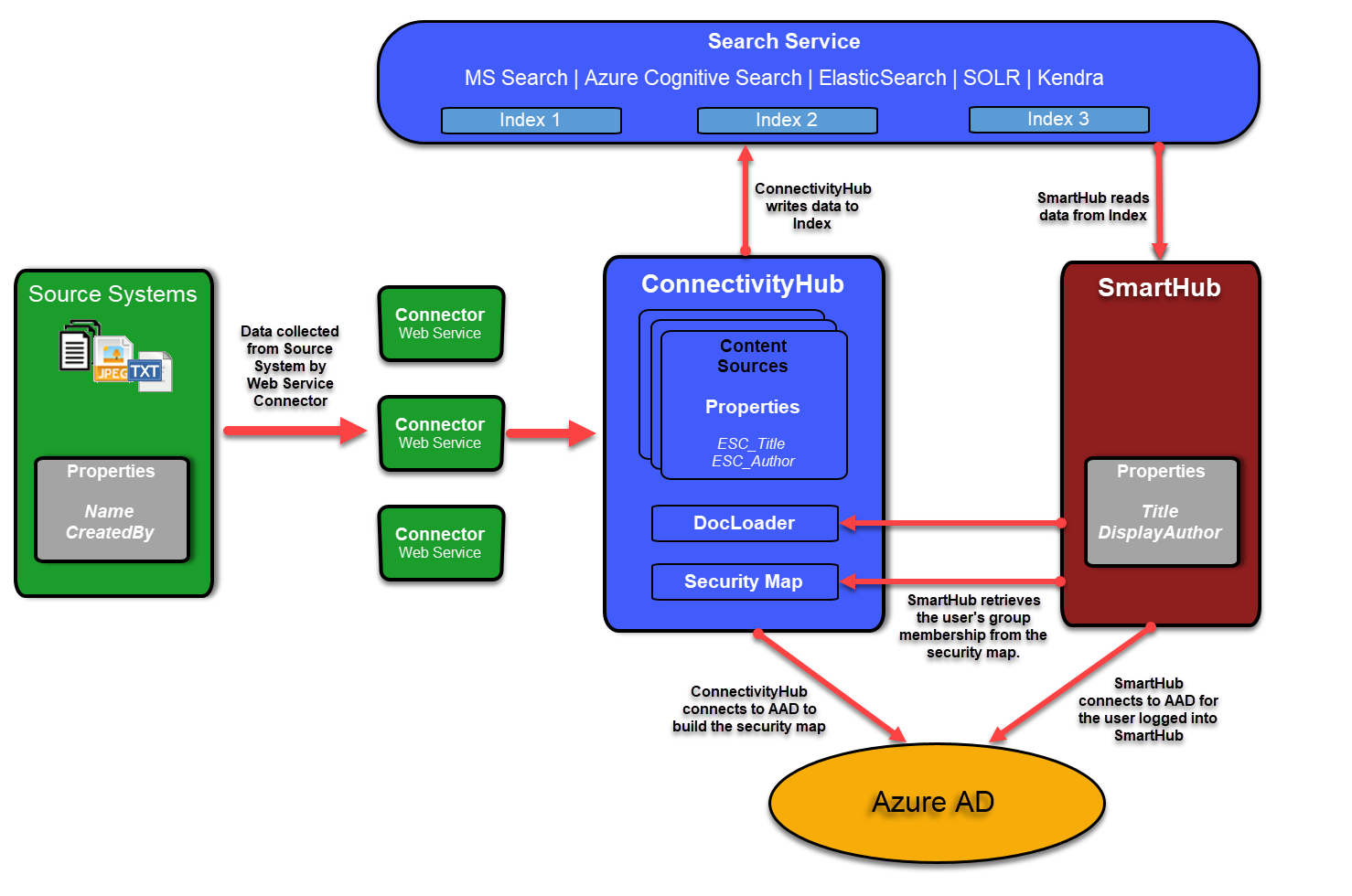What is SmartHub?
SmartHub is a web-based application that appears to users as a website with various layout options. See the graphic below.

SmartHub Capabilities and Key Facts
You may see the SmartHub URL referred to in the documentation as http(s)://<web-app-url>/_admin
-
The SmartHub website acts as a search portal for a collection of search engines.
-
Supported search engines are listed below.
Main Search Engines
-
Amazon Kendra
- Azure Cognitive Search
- Elasticsearch
- SharePoint Online
- SharePoint 2013/16/19/SPSE
- Solr
Additional Search Engines
-
Bing News
-
Bing Search
-
Documentum
-
Egnyte
-
Expertise
-
iManage
-
Microsoft Academic Knowledge
-
Microsoft Search Drive Items
-
Microsoft Search Events
-
Microsoft Search External Items
-
Microsoft Search Message
-
NetDocuments
-
PubMed
-
RightFind
SmartHub runs stand-alone with the above mentioned search engines.
SmartHub acts as a custom Results page for SharePoint 2013/16/19/SPSE and SharePoint Online.
- and Machine Learning-based recommendations
Integrated with Other BA Insight Products
Combined with other products in our software portfolio, SmartHub provides the following capabilities:
- Connectivity to over 70 on-premise and cloud-based enterprise systems, using our indexing connectors, to provide secure unified access to all your information.
- Auto-tagging and Text Analytics adds metadata and intelligent processing to content using our AutoClassifier Help.
- Best of Breed Cognitive Search: Our best-of breed approach integrates Microsoft Cognitive Services and Google Cloud Machine Learning.
- For example, Image Search identifies objects and text within images, including figures and pictures embedded within documents, to provide quick and powerful discovery of images as well as better findability.
- Plug in our Smart Previews to quickly visualize and re-use content regardless of format or location.
SmartHub Site Administration
- SmartHub can be accessed by default from a web browser using the URL you set up when installing SmartHub.
- This URL varies depending on the network environment and your unique choices:
- Host name and port:
- http://<hostname>:<port>
- If accessing SmartHub from the server on which it is installed, localhost is used:
- http://localhost:<port> (such as 8080).
- Fully qualified domain name <hostname>.<domain>.com:<port> Example: SmartHub.bainsight.com:4433:
- <hostname>.<domain>.com:<port>
- SmartHub.bainsight.com.
- DNS The system that converts website domain names (hostnames) into numerical values (IP address) so they can be found and loaded into your web browser. entry
- Host name and port:
- This URL varies depending on the network environment and your unique choices:
- The SmartHub administration interface can be found at the address: http(s)://<YourSmartHub-URL>/_admin
SmartHub and Elasticsearch
For information about Elasticsearch support, see SmartHub with Elasticsearch
Key Features
-
-
Enables your users to find the information they need by making requests as if they were speaking to a person.
-
This eliminates the need to learn complex query syntax in order to find the specific information you seek.
-
-
-
BA Insight’s AutoClassifier Help applies AI-based linguistic analysis to determine the key concepts contained within documents.
-
SmartHub leverages this information to deliver documents which contain the same concepts as those in the search result but do not match the user’s query, thereby delivering additional highly relevant information to the user.
-
-
-
Knowledge of the meaning of a document is also used to generate a brief document summary.
-
Through SmartHub, users can quickly review this summary to determine whether a document which appears in their search results is relevant to their current needs.
-
-
Machine Learning-Based Recommendations and Analytics:
-
Uses our SmartHub Analytics to surface recommendations and suggestions, so that users have the information they need, when they need it.
-
-
Personalized and Relevant Information Delivery:
-
SmartHub’s unique Intelligent Engine taps into each user’s context to provide personalized dashboards and highly relevant results.
-
-
-
Users quickly become frustrated when their searches yield no (or too many) results.
-
Our Bot can detect these situations and provide assistance.
-
It may leverage analytics data to:
-
Suggest a query previously executed by other users
-
Suggest removal of a filter
-
Suggest a more restrictive query depending on the situation.
-
-
-
Internet-Like User Experience:
-
A complete UI framework provides many features including visual refiners, intelligent type-ahead, and configurable results presentation.
-
-
-
As users begin typing queries, SmartHub will dynamically generate type-ahead suggestions of multiple types.
-
Category Matches search available metadata and suggest matching values, applying Machine Learning to analytics data to deliver suggested queries based on previous searches.
-
It is extensible for delivering suggestions of other types as well.
-
Suggestions of People or Content results match what the user is typing.
-
-
Supports Multiple Platforms: Lets you use the best search engine The search engine your SmartHub instance uses to perform queries. SmartHub can be configured to use more than one search engine. for the job or mix-and-match them to handle a wide range of applications.
-
Supported platforms include:
-
Elasticsearch
-
Elastic Cloud
-
Elastic Cloud Enterprise
-
Azure Cognitive Search
-
Office 365
-
SharePoint On-Premise 2013/16/19.
-
-
-
Multi-Index Search:
-
Data residency, the use of multiple search engines, or sources which are not suitable to indexing make a single search index impossible.
-
Search Orchestration transmits users’ queries to multiple indexes at once, providing a single interleaved set of search results and facets.
-
SmartHub Interoperability with other BA Insight Applications
SmartHub and ConnectivityHub
BA Insight SmartHub reads data from the Search index that ConnectivityHub writes to. See the graphic below.
Recall that ConnectivityHub works with BA Insight connectors to collect data from the environment's content sources (Source Systems in the diagram below).
